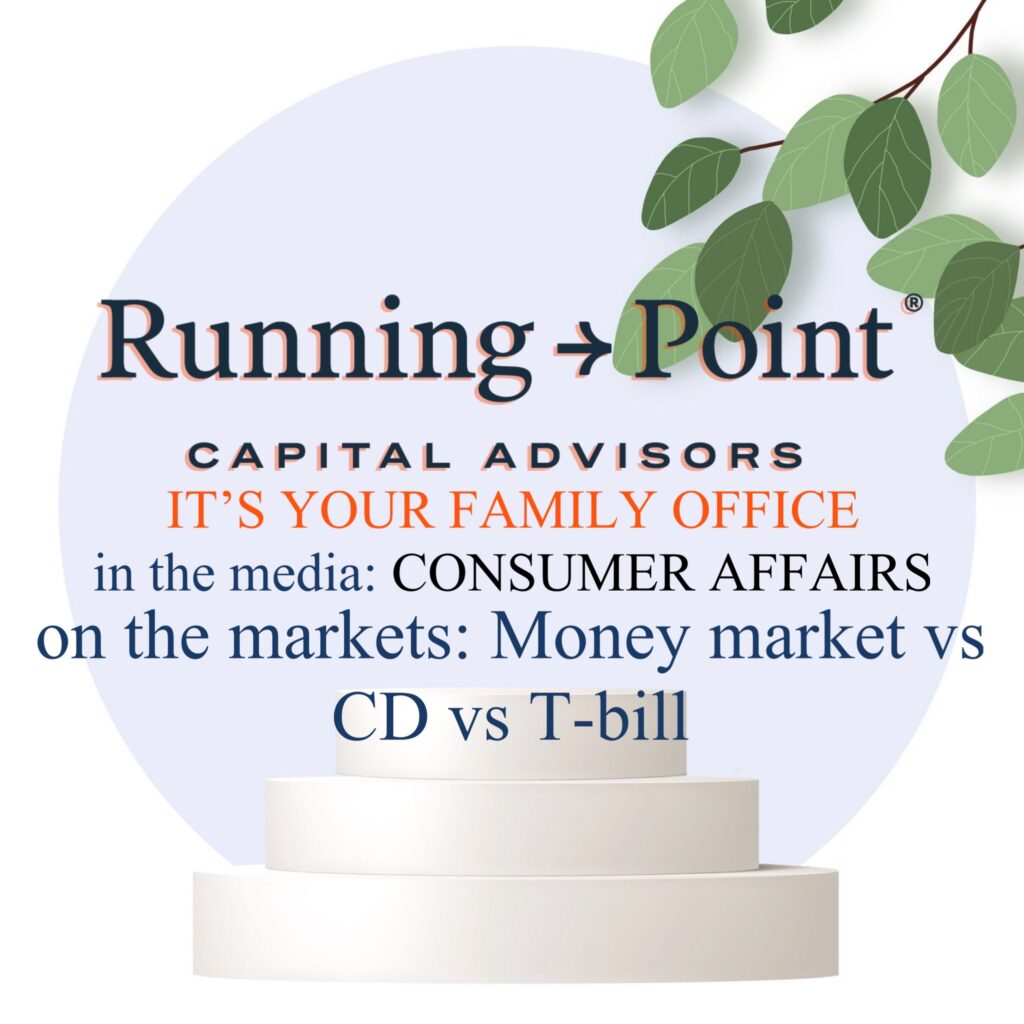Where to earn interest on your money?
Running Point and its chief investment officer, Michael Ashley Schulman, CFA, were quoted by Consumer Affairs in an article — by Ashley Eneriz, “Money market vs. CD: Which is right for you?” — regarding investing in a money market account (MMA) or certificate of deposit (CD).
Consider financial goals
It’s important to carefully consider your financial goals and needs when choosing between a money market account and a CD. You want to compare the interest rates and fees offered by different financial institutions to ensure you get the best deal for your needs and also understand the FDIC insurance limits. You may be limited to only $250,000 of FDIC insurance on your total bank and CD deposits depending on how the accounts are titled.
How much access do you need to your money?
Some banks may penalize you 90 days’ simple interest for CD terms under 1 year and 180 days’ simple interest for terms longer than 1 year. In fact, Federal law requires a minimum penalty on early withdrawals from CDs, but sets no maximum penalty. Carefully review any specific account agreements and policies or ask a financial fiduciary for guidance.
Federal law requires a minimum penalty on early withdrawals from CDs, but sets no maximum penalty.
T-Bills?
Rather than money markets or CDs, for many of our clients with large sums of cash or liquid assets we’ve recommended a portfolio of T-Bills from 1 to 6 months in maturity based on their liquidity needs. Depending on how they are laddered, the T-Bill portfolios can yield approximately 0.75% to 1.5% more than money market accounts and T-Bill income is not subject to state income tax whereas bank CD income and some of the higher yielding money market accounts that invest in short-term corporate and foreign securities are subject to state income tax. That can make a huge after-tax income difference for our wealthy clients in high tax states like California or New York.
Quoted article excerpt is below:
Which should you choose?
When deciding whether a CD or MMA is better for your savings strategy, Michael Ashely Schulman, a chartered financial analyst, advises that you compare the rates and fees of both products. You also need to choose which features you want your savings investment to have and how accessible it needs to be.
“If you seek easy access to your money and want to be able to write checks or make withdrawals, a money market account might be a better choice,” said Schulman, who is the chief investment officer at Running Point Capital.
“If you have a lump sum of money that you won’t need for a specific period and you’re comfortable with locking in your funds for a set term, a CD might offer a better return,” he added. “However, if you are unsure on when you will need the proceeds, be aware that CDs are subject to withdrawal penalties.”

I like my money where I can see it. Hanging in my closet.
~Carrie Bradshaw, “Sex in the City”
Disclosure: The opinions expressed are those of Running Point Capital Advisors, LLC (Running Point) and are subject to change without notice. The opinions referenced are as of the date of publication, may be modified due to changes in the market or economic conditions, and may not necessarily come to pass. Past performance is not indicative of future results. Forward-looking statements cannot be guaranteed. Running Point is an investment adviser registered with the U.S. Securities and Exchange Commission. Registration does not imply a certain level of skill or training. More information about Running Point’s investment advisory services and fees can be found in its Form ADV Part 2, which is available upon request. RP-23-28


